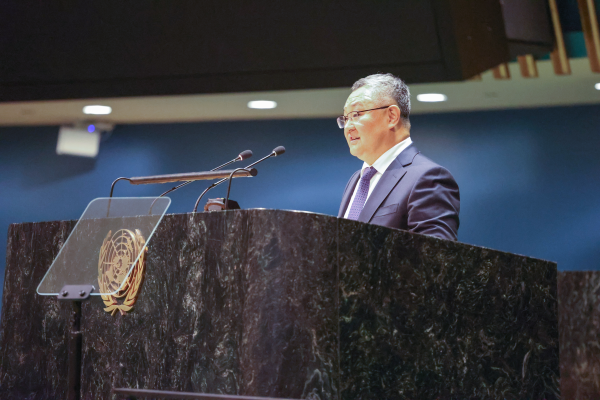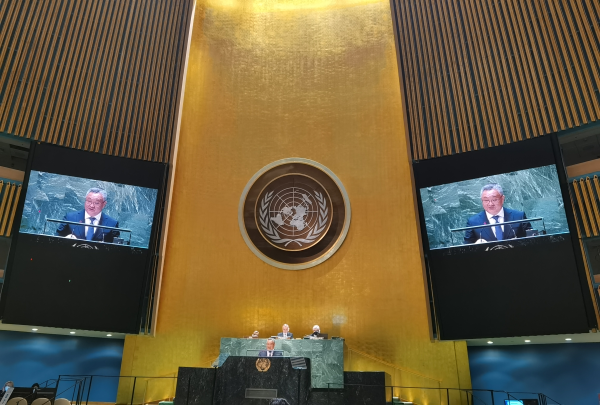On August 1, 2022, the 10th Review Conference of the Parties to the Treaty on the Non-Proliferation of Nuclear Weapons (hereinafter referred to as the NPT) was inaugurated at the UN Headquarters in New York. Director-General of the Department of Arms Control of the Foreign Ministry Fu Cong headed the Chinese delegation to the conference, and delivered a speech at the general debate. He expounded on China's stance on safeguarding the international nuclear disarmament and non-proliferation regime with the NPT as the cornerstone.

Fu Cong said we are living in a world where profound changes and the COVID-19 pandemic, both unseen in a century, are intertwined. The specter of Cold War mentality hangs on, and the outdated approach to security based on military alliances has resurfaced. Driven by the obsession with the so-called major-power strategic competition, the global strategic security environment continues to deteriorate, and risks of arms race and conflicts are growing. As a result, the international non-proliferation regime represented by the NPT is significantly strained and even faces new and the most severe challenges since the end of the Cold War. China advocates taking this Review Conference as an opportunity to promote the three pillars of nuclear disarmament, nuclear non-proliferation and peaceful use of nuclear energy in a balanced manner, so as to breathe new life into the NPT in promoting world peace and development. To this end, China proposes the following:
First, we need to uphold the concept of common security in advancing international nuclear disarmament. China is firmly committed to the path of peaceful development and a nuclear strategy of self-defense, and undertakes not to be the first to use nuclear weapons at any time and under any circumstances. While firmly safeguarding its national sovereignty, security and territorial integrity, China always keeps its nuclear capability at the minimum level required for safeguarding national security. China's nuclear policy, marked by a high level of stability, consistency and predictability, is in itself an important contribution to the international nuclear disarmament endeavor. The principles of "maintaining global strategic stability" and "undiminished security for all" should be followed in the practices of nuclear disarmament. Countries with the largest nuclear arsenals should further conduct significant and substantive reduction of their nuclear arsenals in a verifiable, irreversible and legally binding manner. This will create conditions for other nuclear-weapon states to join the nuclear disarmament process. Nuclear-weapon states need to work together to reduce nuclear risks. On January 3 this year, leaders of China, Russia, the United States, the United Kingdom and France issued a Joint Statement, stressing that a nuclear war cannot be won and must not be fought, and reaffirming that none of their nuclear weapons are targeted at each other or at any other state. On that basis, the five nuclear-weapon states need to further conduct in-depth dialogue on reducing the role of nuclear weapons in their national security doctrines and other issues.
Second, we need to adhere to the direction of political settlement in addressing the challenges of nuclear-proliferation. All parties concerned should stay committed to bringing the JCPOA back on track at an early date through diplomatic negotiations. The United States should completely lift its relevant illegal sanctions on Iran and long-arm jurisdiction measures on third parties. On that basis, Iran should return to full compliance with its nuclear commitments. We should reject double standards in the area of non-proliferation. The nuclear-powered submarine cooperation among the United States, the United Kingdom and Australia poses severe nuclear proliferation risks, in contravention of the object and purpose of the NPT. The review conference should conduct in-depth discussions on its implications in all aspects in order to firmly uphold the international non-proliferation regime. We need to follow the dual track approach and the principle of phased and synchronized actions in advancing the process towards the establishment of a peace mechanism and denuclearization on the Korean Peninsula. The so-called nuclear sharing arrangements run counter to the provisions of the NPT and increase the risks of nuclear proliferation and nuclear conflicts. The United States should withdraw all its nuclear weapons from Europe and refrain from deploying nuclear weapons in any other region. Any attempt to replicate the NATO's nuclear sharing model in the Asia-Pacific region would undermine regional strategic stability and would be firmly opposed by countries in the region and, when necessary, face severe countermeasures. Nuclear-weapon states should sign and ratify all the relevant protocols to the nuclear-weapon-free zone treaties as early as possible, including the Central Asia Zone Free of Nuclear Weapons. China is willing to take the lead in signing the Protocol to the Treaty on the Southeast Asia Nuclear-Weapon-Free Zone.
Third, we need to commit to the fundamental goal of common development and promote the peaceful use of nuclear energy. The international community should support the IAEA in playing a central role, increase funding and technological support for developing countries, and fully unleash the potential of nuclear energy and nuclear technology. We must take a balanced approach towards non-proliferation and peaceful use. Some countries seek to create divisions along ideological lines, stretch the concept of national security, and abuse multilateral export control regime, all in the name of non-proliferation. We must resolutely reject such practices. The peaceful use of nuclear energy should not come at the expense of the environment and human health. The Japanese government should seriously respond to the legitimate concerns of neighboring countries and the international community at large regarding the disposal of nuclear-contaminated water from the Fukushima Daiichi nuclear power plant accident, and fully consult with the stakeholders and the relevant international agencies, in order to find an appropriate solution to the disposal of the nuclear-contaminated water.

Finally, Fu Cong emphasized that this April, President Xi Jinping proposed a Global Security Initiative at the opening ceremony of the Annual Conference of the Boao Forum for Asia. This initiative highlights the necessity to stay committed to the vision of common, comprehensive, cooperative and sustainable security, give due regard to the legitimate security concerns of all countries, uphold the principle of indivisible security, and build a balanced, effective and sustainable security architecture. Guided by this initiative, China is ready to join hands with all countries to continuously strengthen the universality, authority and effectiveness of the NPT, add more stability and certainty to this era of turbulence and transformation, and make new contributions to world peace, stability and prosperity.
Since the NPT's entry into force in 1970, a review conference has been held every five years to review the implementation of the Treaty in nuclear disarmament, nuclear non-proliferation and peaceful use of nuclear energy, and to plan for global governance agenda in the next stage in the field of nuclear energy. This year's review conference was originally set for 2020, but was postponed to this year because of the pandemic. The conference will last until August 26.

 中文
中文





